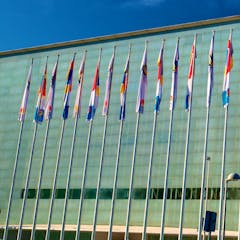
Articles on free trade agreements
Displaying 1 - 20 of 25 articles

If a future government wanted to block fast-tracked projects, it could trigger investor-state dispute settlement clauses built into existing trade agreements, with billions potentially at stake.

Palmer sued Western Australia’s government in the High Court and lost. But an obscure clause in a little-known trade agreement is giving him a second chance

South Africa’s agricultural exports are vulnerable because of reliance on a few markets and weaknesses in domestic logistics chains.

For the EU, the recent trade deal with New Zealand is about a lot more than money. Climate change and expanding its role and influence well beyond European borders are major motivations.

Government modelling projects a mere 0.3% increase on current GDP when the NZ-UK free trade agreement comes into full force. Does that justify the concessions the deal makes?

Australia’s usual approach to big international negotiations is to hold out, before reluctantly making “concessions”. It’s the wrong approach for trade, and the wrong approach for climate change.

The Regional Comprehensive Economic Partnership agreement prevents signatories from tightening regulations, except in specified sectors — and aged care hasn’t been named as one of those exceptions.

Australia won’t release the text until after it is signed.

More countries, including a post-Brexit UK, are looking at joining the CPTPP free trade agreement. But the secrecy around negotiations makes serious analysis virtually impossible.

New Zealand should recognise the high stakes and join the China-Australia WTO hearing as a third party.

President-elect Biden hopes to restore America’s global leadership on issues like trade, but populists in both parties may make his job a lot harder.

Foreign companies can get rights Australian companies can’t, so long as they are actually foreign.

Kenya must pay more attention to the role of this agreement as an investment attraction vehicle and not just a simple tariff centred ‘traditional’ pact.

Investor State Dispute Settlement Procedures open the prospect of legal cases it would cost Australia millions to defend.

Trump’s endgame for the US-China trade war still seems elusive as the conflict continues to escalate.

Trump, who withdrew the US from the Trans-Pacific Partnership when he became president, briefly appeared to consider joining the trade accord again.

President Trump says ‘trade wars are good,’ but history tells a very different story.

The idea that the US is historically a free trading country is a myth. Here’s why that’s a good thing.

Viewed against the odds of success in getting 55 countries to foster meaningful regional integration, Africa has made commendable progress in crafting its own creative approach.

The TPP should still bring enough benefits for the remaining countries to make it worthwhile to go through the trouble of enacting it.
